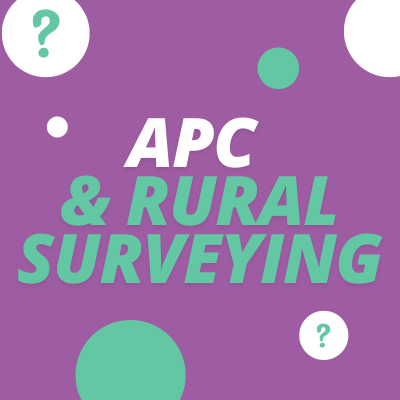
The Importance of APC for Rural Surveying
Hannah Cuthbert, one of our recruiters for the Rural Professionals industry interviewed Caroline Cavill to give us insight into the Assessment of Professional Competence (APC) interviews. Caroline is a qualified FRICS and has over 20 years of experience as a professional educator, specialising in APC tutoring. The APC is a process where rural surveyors can demonstrate their professional competencies followed by a formal interview. Amid APC season, Hannah caught up with Caroline to understand more about the process and the benefits of being a Chartered Surveyor.
Q: What is the APC and why is it important?
A: Sitting your APC is important as it gets you your professional accreditation and demonstrates your professional standing. It also shows credibility. You, your firm and your practices’ clients know they’re going to get a quality service.
Q: What is the layout of the APC process?
A: The APC is a structured way to gain and demonstrate your knowledge and experience within the rural surveying profession and ends with a professional interview at the end.
The interviews usually take place in the spring and autumn interview windows, with the submission of your work evidence prior to the interview – usually February for the spring interviews and August for the autumn interviews.
Q: What 3 things would you tell someone about to sit their APC?
1. Read the competence/pathway guidance and know the pathway guidance inside out.
2. Make sure you know your submission incredibly well.
3. Take a break before you sit your final assessment, don’t revise the night before - ‘it shouldn’t be a stressful process’.
“This is your hour to tell people what you’ve done, what you know, your experience and what advice you’ve given. Your case study presentation is your 10 minutes to tell the assessment panel all about this wonderful project you’ve been involved with”.
Q: What trends have you noticed in the last couple of years?
A: There has definitely been a shift since the pandemic. The changes I’ve seen since are:
1. Candidates not knowing their submission as well as they should.
2. Candidates not being able to articulate as well.
3. Candidates not having as much time in front of clients as previous, lots of meetings are held over Teams now.
4. Candidates maybe aren’t quite as prepared as previous years.
Covid is another factor. People either didn’t go to university, or they spent a lot of time distance learning and didn’t have classroom interaction. For a lot of candidates, when they came out of university, they were working in firms that weren’t out in front of clients as much. There’s a lot of value to sitting in an office where you’ve got someone saying “I’m going out to see x, jump in the car and come with me” – they’re not as exposed as they are with hybrid working.
Q: What do you think the common pitfalls are of the APC process?
1. Not being well enough prepared for the professional interview.
2. Not understanding the process.
3. The lack of face-to-face interaction students have experienced in the last few years.
Q: What does it mean when someone’s been referred?
A: It means that on the day of the interview, the candidate didn’t quite demonstrate their competence against the criteria required. It is important to remember that it is a referral and not a fail.
Q: What does the refer mean?
A: A refer means that the candidate was not successful this time, but the referral report should be written in a way to help them improve for next time – this may be related to any part(s) of the interview.
This is why throughout the interview, assessors will be taking detailed notes, so that if referral feedback is required, it can be used to provide quality guidance for sitting again at another session.
Q: What service do you offer?
A: I tailor my offering to candidates. I offer packages that can be a longer-term or shorter-term plan, depending on where people are on their APC journey, or I can do it on an hourly basis.
I offer bespoke packages or off-the-shelf packages that are a fixed price. An example of a one-off package would be that I can go through a rough draft submission from beginning to end and add commentary and critique throughout.
Q: Why should someone use you? How does it help?
A: Because a really well-prepared candidate has a lot better chance of having a better experience on their APC journey.
Some candidates are well-supported by their firms, others aren’t and are reaching out individually.
Q: What career advice would you give to someone after they pass their APC?
A: There are so many rural people who work their way through firms and stay forever, some that move about for various reasons/changes in circumstances.
I often speak to some clients a few years later who want to change but feel like they’re stuck. However, there are so many transferable skills gained. There is a lot of value to their wider skillset which I don’t think they always recognise. For example, rural surveyors would’ve dealt with people in big country estates, the gamekeepers, the estate tenants. They’ll know about farming practices, planning, dealing with tenants, selling property, drawing maps etc.
After the APC and going forward there are so many options out there, so don’t feel stuck in a rut. It’s important to grab any opportunity – before and after APC.
If you don’t enjoy your job ring Hannah! Get a different one.
Life is too short to stay somewhere you don’t enjoy.
---------------------------------------------------------------------------------------------------------
Get in touch!
If you are interested in starting your rural career, or you are looking to take your next rural career step, please reach out to myself, Hannah, for a confidential chat.
My contact details can be found by clicking here.
